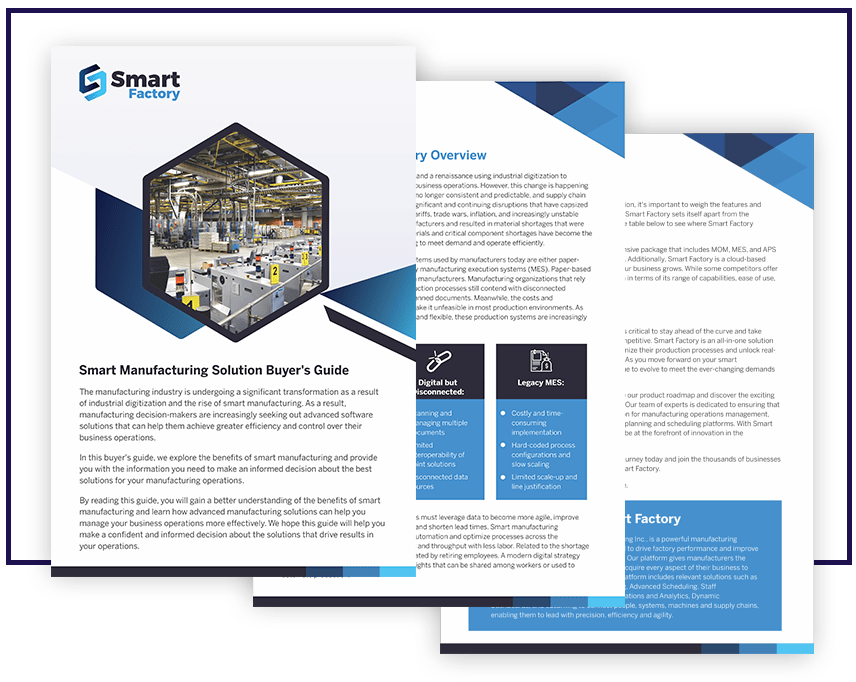MES Explained
- It improves the quality and makes production management more efficient and effective.
- It offers a fast and smooth production process and ensures a reduction in defects.
- It aids proper and effective resourcefulness and utilizes machinery to its full potential.
- Cost reduction and savings result from smoother production and resource usage.
- MES helps you track information in real-time with increased visibility and accuracy.
MES implementation

Understand your needs

Creating a successful team


Find the perfect partner

Define System Goals and Architecture


Schedule the implementation

Configure, Test, and Iterate


Revise, Train, and Flourish
How can MES functionalities help optimize the production process?

We help you to select the best option
Visibility and Efficiency
One of the primary functions of MES is to provide real-time visibility into the manufacturing process. This visibility allows manufacturers to monitor and assess the performance of their operations by employing key performance indicators (KPIs) like Overall Equipment Effectiveness (OEE). OEE offers insights into availability, performance, and quality, which are crucial aspects of operational efficiency.
- Availability: MES can track downtime and provide insights into the reasons behind it. This data helps manufacturers identify and address issues that lead to production stoppages, ensuring machines are up and running as much as possible.
- Performance: MES monitors the efficiency of manufacturing processes, highlighting any bottlenecks or inefficiencies. This enables manufacturers to optimize workflows, allocate resources more effectively, and reduce cycle times.
- Quality: MES systems can track and trace product quality at every stage of production. This ensures that substandard products are identified and addressed promptly, reducing waste and improving overall product quality.
Quality and Product Control
- Monitoring and recording data at each stage of production, allowing for immediate detection of quality issues.
- Enabling automatic notifications and alarms when quality parameters deviate from the established standards, ensuring that corrective actions can be taken in real-time.
- Facilitating the collection of data for compliance and regulatory requirements, ensuring that products meet industry standards and regulations.
Materials/Labor Costs
- Offering inventory management capabilities, allowing manufacturers to track and manage raw materials, components, and finished products in real time. This minimizes waste and ensures optimal resource utilization
- Providing workforce management tools, helping manufacturers optimize labor allocation, track labor hours, and improve workforce productivity.
- Supporting predictive maintenance, which helps prevent costly equipment breakdowns by identifying potential issues before they become critical.
Reporting and Decision-Making
- Offering comprehensive reporting and analytics tools, allowing manufacturers to create customized reports and dashboards that provide insights into production trends and performance metrics.
- Enabling real-time data access for stakeholders, ensuring that decision-makers have access to the information they need to make timely, data-driven choices.
- Supporting continuous improvement initiatives by identifying areas that require attention, such as process optimization, resource allocation, or equipment upgrades.
Look Towards The Future
Smart Factory MOM: Reinventing MES
- Schedule resources and production operations effectively by using an advanced scheduling system called Opcenter APS
- Track data collection, employees, equipment, and jobs in real-time
- Automate data capture from machines and other devices
- Analyze factory performance with loss visualization
- Go paperless at the shop floor with downtime alerts and notifications and collaborative messaging
Why Should Smart Factory be the First Choice for MES in Your Factory?

One Solution
An all-in-one solution that integrates scheduling, production, asset management, training, notifications, analytics, quality management, and dashboards to enable manufacturers to optimize their manufacturing workflow.

Configurable
Easy to configure for any industry and any device, allowing data communication and automation between humans and machines. Plug and play integrations with ERP and devices further make it effective for managers to make informed decisions.

Fast Deployment
The Smart Factory solution contains different modules that can be deployed or implemented as per the organization’s needs, which means it promotes rapid and fixed-price implementation for each module.

Real-Time Insights
Smart Factory provides real-time insights about resources, operations, production tasks, and any other data that is relevant to manufacturing operations. Such insights help decision-makers to effectively overcome challenges and improve productivity.

Machine Connectivity
Smart Factory MOM supports over 100 drivers, 80 devices or brands, and 100 communication protocols, enabling automated data capture from machines and other devices and providing seamless connectivity for Industry 4.0.



